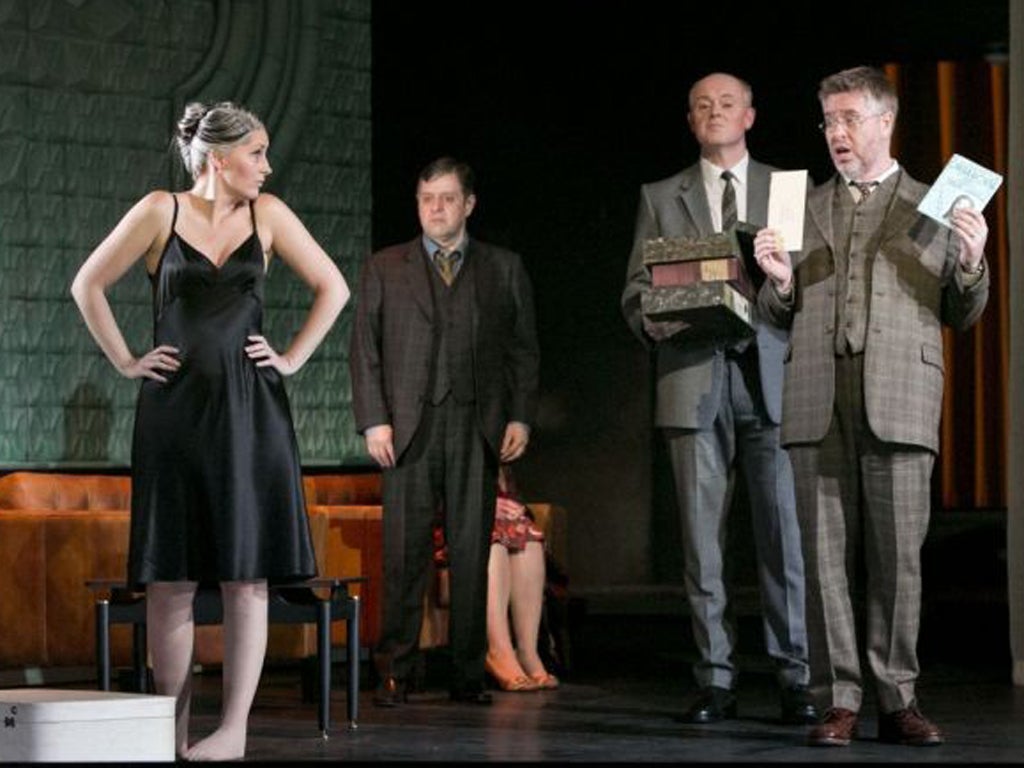The Makropulos Case, Festival Theatre, Edinburgh A Mass of Life, Usher Hall, Edinburgh Proms 42 & 44, Royal Albert Hall, London
Opera North's production of Janacek's bristling comedy of ageing and identity is stylish, salty, sardonic

Emilia Marty, aka Eugenia Montez, aka Elian MacGregor, aka Ekaterina Myshkin, is bored. Born Elina Makropulos, the lawless, loveless, ageless heroine of Janacek's The Makropulos Case is adrift in the 20th century; her famed beauty finally fading, her children too numerous to count, her suitors mad, dead or otherwise disappointing. How old is EM? "Over 40!" according to Kristina, the young singer whose fiancé is the latest to fall under Marty's spell. "Three hundred and thirty-seven", according to the diva herself.
Adapted from Karel Capek's 1922 play, Janacek's bristling comedy is powered by two mysteries: a missing will and an ancient formula for eternal life. Premiered at the Edinburgh International Festival, Tom Cairns's Opera North production adds a further three decades to EM's age and to the intractable lawsuit of Gregor vs Prus. Hildegard Bechtler's cool, stylish designs place us somewhere in the 1960s. With two notable exceptions – Adrian Dwyer's corduroy-suited youngster, Janek, and Nigel Robson's flamboyant elderly madman, Hauk – the men are clad in sober business suits, while Ylva Kihlberg's EM is a parody of high-maintenance femininity: first, a back-combed, panty-girdled hour-glass in Chanel tweed, then, in Cairns's unscripted entr'acte, a siren in a column of scarlet sequins.
Bored and beautiful is a dangerous combination. Devoid of maternal instinct and tender only to Hauk and, belatedly, Stephanie Corley's wide-eyed Kristina – EM obsessively checks her appearance for signs of decay. Only later, in her bedroom, after an uninspiring tryst with Robert Hayward's sulky Baron Prus, do we see her begin to age. Emilia Marty's brunette bouffant wilts on a wig-stand while Elina Makropulos's long grey hair turns slowly, magically white to an epiphanic flourish of trilling horns. While Janacek's string writing slyly alludes to more Romantic operatic deaths – the maudlin gauze of La traviata – the hectoring brass celebrate the death of Romanticism itself. The humour is salty, sardonic, the pulse taut. Brilliantly paced under conductor Richard Farnes, and dynamically sung by Kihlberg, Robson, Corley, Dwyer and Hayward, with picaresque support from Sarah Pring (Cleaner), James Creswell (Kolenaty), Mark Le Brocq (Vitek) and Paul Nilon (Gregor), The Makropulos Case cements Opera North's reputation as a true ensemble company.
Janacek's muscular wit was an antidote to the dizzy mysticism of Delius's paean to Nietzsche's Also sprach Zarathustra, A Mass of Life. Conductor Andrew Davis sprinted through "O Du meine Wille", dragging the plucky Edinburgh Festival Chorus screaming behind him while the string, wind and brass sections of the Royal Scottish National Orchestra disappeared under a corruscating dazzle of percussion. Delius's delicately wrought chromatic string writing and fecund woodwind chording emerged fitfully in the languid oblivion of the slower sections, but I was too agog at Nietzsche's "sinkenden, trinkenden, winkenden" rhyming overkill (and the growing strain on Hanno Müller-Brachmann's voice) to succumb. All "la-la-la" and exclamation marks, it was as though the toga'd figures in Gerald Moira's frieze at the Wigmore Hall had come to life as dancing giants and giantesses: impressive but exhausting.
At the Royal Albert Hall, Susanna Malkki and the Philharmonia framed the UK premiere of Olga Neuwirth's 2009 viola concerto Remnants of Songs ... an Amphigory with the first suite from Prokofiev's Romeo and Juliet and Bartok's Concerto for Orchestra (Prom 42). With the beat held between the thumb and forefinger of her right hand, Malkki's unfussy direction lent crispness to Prokofiev's crocodile tears and the brooding burlesque of the Bartok. Neuwirth's flinching harmonics, spiralling celesta motifs and rattlesnake percussion suggested a state between conscious and unconscious as soloist Lawrence Power and the orchestra explored half-remembered, half-imagined shreds of music from baroque to classical, ballet to dance hall. Neuwirth's voice is beginning to emerge from behind the collages of quotations in her work and it is beguiling, witty, distinct.
On Tuesday night, the hall slowly settled into silence as the first few dozen of the 100 metronomes in Ligeti's Poème symphonique stopped moving (Prom 44). It was a curiously sentimental silence, the result of collective anthropomorphism and the gulp of surprise as trombonist Byron Fulcher stepped down to the stage in a clown suit, to banana-skin glissandi and Pagliaccio sobs – programming genius on the part of London Sinfonietta and conductor André de Ridder. Berio's Sequenza V for trombone is one of the great miniature musical dramas of the post-war period, more appealing than Xenakis's terse Phlegra and even Louis Andriessen's infectious De Snelheid.
Is there a limit to the amount of high-quality silence that any audience can deliver? After Jonathan Harvey's ecstatic Mortuous plango, vivos voco – remastered for the Proms and akin to being cradled in a bell while a lone treble voice is fragmented into tiny tongues of fire – the intensity of attention was like no other I have known. Cage's silent/not silent 4'33", the ultimate in audience participation, felt empty by comparison.
'The Makropulos Case', Leeds Grand Theatre (0844 848 2700) and touring, 18 Oct to 22 Nov
Critic's choice
Edinburgh highlights include Philippe Herreweghe and the Orchestre des Champs-Elysées (Mon) and Franz Welser-Möst and the Cleveland Orchestra (Tue and Wed). Grimeborn Festival at the Arcola, Hackney, east London, from Tuesday, includes the UK premiere of Philip Glass's The Sound of a Voice. At the Royal Albert Hall and on Radio 3, in the BBC Proms, Valery Gergiev and the LSO perform Prokofiev's Cinderella (Wed) and ENO reprises Peter Grimes (Fri).
Subscribe to Independent Premium to bookmark this article
Want to bookmark your favourite articles and stories to read or reference later? Start your Independent Premium subscription today.

Join our commenting forum
Join thought-provoking conversations, follow other Independent readers and see their replies